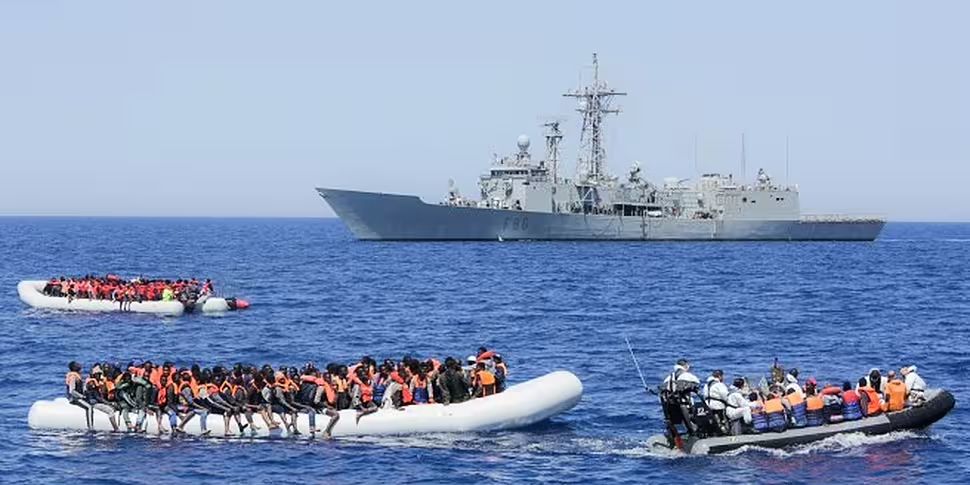Concerns have been raised over the Government’s decision to redeploy Irish navy troops in the Mediterranean.
The Dáil this evening approved a proposal from the Minister of State for Defence, Paul Kehoe to transfer Irish troops from their current humanitarian mission to participate in the EU Common Security and Defence Policy mission - ‘Operation Sophia.’
Operation Sophia is a European military operation targeting gangs and vessels involved in trafficking refugees out of Libya.
Previously, under ‘Operation Pontus,’ in collaboration with the Italian government, Irish troops were solely engaged in humanitarian search and rescue missions in the area.
The Irish Navy has rescued over 16,800 people in the Mediterranean in the last three years.

Triple lock approval
This evening’s decision required “triple lock” approval – UN sanction, the approval of Cabinet and the approval of the Dáil – in order to proceed as it involves Irish troops in an international military operation.
Minister Kehoe said the decision will see Ireland “making a contribution to addressing some of the root causes of migration and human trafficking.”
The Dáil motion was passed with the support of Fianna Fáil – however it has been heavily criticised by opposition parties, who have warned that it has been rushed through without proper consideration.
Irish Neutrality
Sinn Féin spokesperson on defence, Aengus Ó Snodaigh warned that the decision will “completely alter” the Irish navy’s role in the area.
He claimed Operation Sophia is a “military response that will only worsen the humanitarian crisis in that war torn region.”
“Operation Sophia is yet another breach of Irish neutrality, as it sanctions the deployment of our Naval Service to participate in an offensive military alliance,” he said.
“It involves training the Libyan coastguard, that has been found abusing many of the people it catches on boats by threatening their safety, and it will assist them in their efforts to forcibly return fleeing refugees to so-called ‘migrant detention centres,’ he said.
He voiced his unequivocal support for the "very important role the Irish navy has played in the region" – but warned that role could now be “jeopardised and degenerate into military confrontations with potentially disastrous consequences."

People aboard the Irish Navy vessel LÉ Niamh en route to Palermo, Sicily after they were rescued from the Mediterranean Sea, 06-08-2015. Image: Irish Defence Forces
UK government report
A cross-party House of Lord’s report in the UK earlier this week concluded that Operation Sophia has resulted in an increase in migrant and refugee deaths at sea.
The report found that the policy of destroying smuggling boats has simply seen traffickers sending refugees out in smaller, unseaworthy vessels - leading to further deaths.
The number of recorded casualties on the central Mediterranean route between Libya and Italy rose by 42% to more than 4,500 in 2016.
Operation Sophia was launched in May 2015.
The UK report warned that the operation had failed in its mission – and had little impact on the flow of migrants.
Sandip Verma, chair off the UK EU external affairs sub-committee, called for a change of focus - adding that trafficking should be tackled on land, in source and transit countries.
“Once the boats have set sail, it is too late,” she warned.
The report found that the search and rescue element of the operation – which has saved many lives – should continue.
Humanitarian concerns
A number of humanitarian groups, including the Immigrant Council of Ireland, the Irish Refugee Council and Medicins sans Frontiere have also voiced concerns regarding the mission.
Disappointing motion to join failing #OperationSophia passed in the Dáil. Irish Naval mission should prioritise saving migrants' lives
— Immigrant Council.ie (@immigrationIRL) July 13, 2017
Labour Party Leader Brendan Howlin said he had “grave concerns” at the change to the Irish naval mission in the region – and accused the government of rushing through the motion without allowing members time to fully debate the consequences.
"I have not been reassured that our armed forces will play no role in supporting efforts to return refugees and migrants Libyan detention centres,” he said.
"There is no detail on whether the Irish Government has considered these concerns, nor were we provided with any background briefing papers or notes provided to Deputies.”
"I am saddened that the Government has decided to rush through this important motion with limited debate, analysis or consideration."









